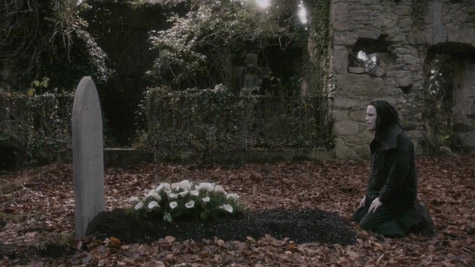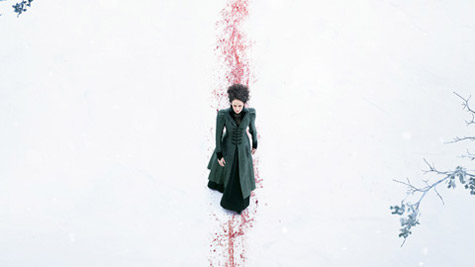
*Deep breaths*
Okay. Because I am a Gothic Victorian novelist well versed in Penny Dreadful’s tropes and subject matter, I’ve spent the past few months railing on panels (like DragonCon), ranting on Twitter, writing requested posts about the ending of the show, and addressing the regressive aspects of the finale and the storytelling disservice to what were otherwise incredible characters.
You know from my Penny Dreadful posts that there was a lot to love about the show. Some episodes will always remain the most incredible hours of television I’ve ever seen. I want to see Patti LuPone do everything, always—I can never get enough of her. Billie Piper’s monologues as Lily were heartbreaking and incredible, some of the best writing and acting in the show. Rory Kinnear’s performances throughout were Emmy worthy; the portrayal of the orderly he was before becoming Frankenstein’s “monster” and then his later scenes … jaw-dropping, breathtaking work. Loved Shazad Latif’s Jekyll and where that was going. Not to mention the truly inimitable powerhouse that is Eva Green.
But, within this trope-laden show that tried to do new things in Gothic genre study, there was harm done by what was hardly new. By Season 2, I had concerns; I was troubled by the sole deaths of the one character of color and the trans character in the end of the second season. They died without something to offset those tired, oppressive tropes, relegating their deaths into merely “this is a place where bad things happen.” Funny … all the white men seemed to keep surviving just fine, no matter how inept (Frankenstein).
I’ve posted here before that I am very weary of narratives where a woman dies solely for the character arc of serving male pain or development. It’s tiring, it’s toxic, and it’s dehumanizing—as if we’re just plot device rungs on ladders. This narrative in Hollywood disproportionally affects female characters, who are cast in smaller numbers. For all the strength and power of Vanessa Ives, Penny Dreadful’s central “hero,” in the end she just limply gives up and gives over to a “mercy killing” by a male hand. No central character should face such a 180-degree reversal without really good writing, clear and strong justification, and the appearance of agency to make their own choices. It made no sense.
See also: Building Character Is Murder: Should We Resurrect for the Same Reason as We Kill?
I’ve been told by industry insiders that there were all kinds of things going on behind the scenes: conflicts with Showtime, budget issues, lack of time, Eva Green wanting to move on, etc. I get that the show was rushed into an ending. But John Logan came out and said it all went according to plan. If that’s the case, then the plan was regressive, incomplete, and baffling storytelling. If he had run with saying it didn’t end exactly to plan, I might have given this guy another chance. It seems clear from the storytelling trajectory (and HUGE unresolved plot holes) that a 4th season was at least hoped for.
I work in film and television. I know that running a show is a colossal beast, but you do have options and post-production. I also write Gothic Victorian paranormal narratives and have been doing so for a decade. I know it isn’t easy to balance violence, darkness, and Gothic extremes, as well as deal with wild tropes and stereotypes, but with careful attention to power dynamics and agency, it can be done in a satisfying way without resorting to the limiting 19th-century worldview this show was supposedly attempting to subvert.
So, I’d like to offer up—as a storyteller who is always thinking of ways to resolve narratives—a few changes that could have made Penny Dreadful’s finale more satisfying and a better arc for the main women of the show. Some of these alternatives would only have required a few tweaks of a shot, one effect, a beat or two of action, a slight shift of camera, and a few lines of different script to have made a better, more palatable peace with the ending of a beloved show.

Thought 1: Lily Frankenstein could have given Victor exactly what he wanted—a blissful, happy mind—and driven home a swift blow of quick justice for good measure. In the scene in Jekyll’s lab, the serum that would essentially re-write/erase Lily’s mind is lying within her reach. Even though she is chained like an animal, she could have grabbed it, injected him, and boom—there’s the deluded man he wanted to be all along. He wouldn’t know any better, and poetic justice is served. He could have participated in all the rest of the action as dazed and useless as he was in the final fight.
Thought 2: For all Hecate’s power as a witch, in the end she transformed into her naked form and got instantly shot on a table and disregarded like a redshirt. I didn’t like the character, but she deserved better than that—at least a moment of consideration. The whole Wild West narrative was a hot mess. At any point, these supernaturally gifted people could have, you know, used their powers in a time of crisis. *flips a table* But no, let’s watch Ethan be a whiny emo while everyone around him gets shot. (Note: Ethan couldn’t shoot dad but he took Vanessa right out.)
Thought 3: Vanessa Ives could have shown us a more decided choice in giving over to Dracula rather than a weak and weepy submission. She could have shown us some of her famous steeled strength while facing the darkness directly. It felt like the show and the writing were punishing her for all the strength the character had shown up to this point. She was unrecognizable. If we’d even seen in her eyes, her fierce face, the knowledge that she was going to go there, to the dark side, at least we could have seen a decided choice rather than a resignation.
I don’t object to characters dying in a show, turning “evil” or what have you, I just want it to be by the character’s own agency and choices—especially if they are characters who, in society, don’t have the upper hand. Better yet, I’d hoped she would have given over to him, taken his powers, and used them against him in a clever new way—hearkening back to Stoker’s Dracula but with greater ferocity.
Thought 4: In a show where we’re very aware that the world is dark and that everyone is fatally flawed, Vanessa could have embraced the admittedly problematic “mother of darkness” narrative entirely. She could have taken over with a power that blew everyone away in a London Apocalypse. The show could have ended in that dreadful pall, going out with a wicked bang rather than a whimper.
The show seemed to want to end with the bad guy still at large (there was no resolution of Dracula, it was very anticlimactic). It could have been an epic reign of “no one wins,” and the tables of sacrifice would have turned and leveled everything in its path. It would have been a very nihilistic ending, but it’s a “dark and stormy night” show that never advertised otherwise. If you’re going to go out, go out big and wild rather than with the overtired female sacrifice, yet again, while all the rest of the main male characters come out entirely unscathed.
Thought 5: In the midst of Jon Clare’s poetry, a scorpion could have crawled up from Vanessa’s grave. Easy. Simple shot. This could have shown us resilience, cleverness—the essence of Vanessa’s indomitable spirit we spent every episode but the final ones cheering. This simple, subtle offering could have celebrated the paranormal power that girded the whole series. In this moment, Vanessa’s important animal totem and Jon Clare—the beautifully poetic monster who was more human than any of them in the end—could have shared a chilling understanding.
Out of everything, I’d have liked to have seen this most—some sense that the keen Vanessa we knew and loved had inhabited her final hours and given us the kind of wondering breath that we were left with when the “bad guy” Dracula vanished. It could have been a certain cycle resetting, an intriguing question mark—an eternal mystery.
I’ve said many times that to create a really incredible, compellingly portrayed character who is Mina Harker strong and to, in the end, give her the Lucy Westenra treatment in 2016 is more regressive than many of the stories, written over 120 years ago, this show aped. Why do such a half-baked job of overturning and poking at certain tropes and then keep the most selectively violent ones in place for those who have the least societal power without a clear story-driven and character-based imperative as to why that’s so?
Similarly to Game of Thrones, while a lot of violence happens to women, there have been startlingly few female writers on the series, especially as each has progressed. It shows and it hurts. And I’m angry, because it didn’t have to.
Cheers! And, as always, Happy Haunting!
Leanna Renee Hieber is an actress, playwright, artist and the award-winning author of the new Eterna Files trilogy of Gothic, Gaslamp Fantasy novels for Tor Books; the Magic Most Foul saga, a Gothic Victorian YA trilogy; and the acclaimed, bestselling Strangely Beautiful saga, which includes The Strangely Beautiful Tale of Miss Percy Parker, now available in new, revised, author preferred editions from Tor.
A classically trained performer and proud member of Actors Equity and SAG-AFTRA, she lives in New York City and works in film and television, is a tour guide for Boroughs of the Dead, and crafts Steampunk, Gothic and Neo-Victorian jewelry and art. Follow her on Twitter @leannarenee or Facebook.
Free reads, more information about her novels, and writers resources can be found: http://leannareneehieber.com
